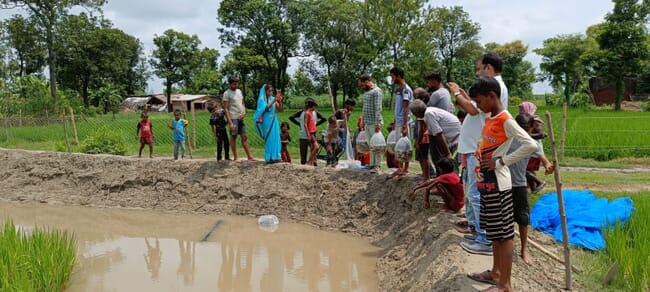
© TRI
Shail Kumari, a farmer associated with Urra Shobha Purva SHG in the Mihinpurva block of Bahraich, Uttar Pradesh, faced challenges in supplying sufficient food grains for her family due to seasonal flooding.
Upon discovering fish farming through Transform Rural India’s Aqua School, Kumari decided to excavate a fish pond in her one bigha land, investing Rs 10,000 with support from the village organisation, while TRI provided fish seed and bird nets. Kumari earned a profit of Rs. 5,000 from her rice production and a total income of Rs. 40,000 from fish farming. Additionally, fish farming reduced pests in the rice crop and eliminated the need for extra fertilisers. Currently, Shail Kumari plans to expand fish farming across her entire field in the future.
According to TRI, many other women farmers in the rural villages of UP are efficiently integrating fish farming into their conventional crop cultivation thanks to the Aqua Schools initiative. Through the initiative, TRI’s main goal is to revolutionise fish farming practices, enhance productivity within the region, and promote aquaculture. It also includes comprehensive capacity-building programmes, where women farmers receive ponds and technical support from TRI facilitators. Subsequent training equips them with the necessary skills in fisheries management.
TRI says that nearly 100 women farmers have already benefited from the project and the programme will be further extended to more villages soon.
"As part of the initiative, we’re providing assistance for services such as water testing, the supply of fish food, marketing support, and helping construct artificial ponds for demonstration purposes. The Aqua Schools are part of TRI’s commitment to bringing multidimensional transformation to rural communities. We don’t just help villagers find innovative livelihood opportunities, we also train them in maintaining and marketing their product or service as well as market and delivery support," says Gaurav Misra, TRI’s operations director.
The collaboration between TRI and local farmers not only enhances fish production but also significantly contributes to the socioeconomic empowerment of women in the region, enabling them to embrace innovative techniques in fish farming. For example, Ram Rani, a farmer associated with Gram Panchayat Urra Gulra SHG, has repurposed unused land near her house for the biofloc model in fish farming. The expenses incurred for creating a 25×25 foot pond on the vacant land were Rs 5,000 for digging, Rs 50 for lime, Rs 300 for cow dung manure, and Rs 1,500 for khali (mustard cake). Fish seeds for the pond were provided by TRI.
"Now, our pond holds 50-60 kg of fish, which is estimated to be worth at least Rs 15,000. Currently, we are considering further expansion,” says Rani.
Beyond traditional fish farming, the Aqua Schools also encourage farmers to adopt integrated farming practices, incorporating the cultivation of makhana, chestnut, or lotus, alongside poultry and duck farming as pond-based activities. Furthermore, the borders of the ponds are utilised for growing seasonal vegetables and flowers, contributing to sustainable income generation.
“We had support for both agriculture and fish farming, and when we sell the produce or enjoy it at home, it is very nutritious and everyone stays healthy in the family, too,” says Manju Devi, who benefitted from an Aqua School set up around her village in Gangapur.
Shail Kumari, a resident of Sohapur, asserts the same.
“We reared fish through this initiative and also produced food. When we farmed the fish, we made use of some as food for our family, and we were able to sell the rest. The best part is that we were able to grow both food and fish through this support,” she says.



